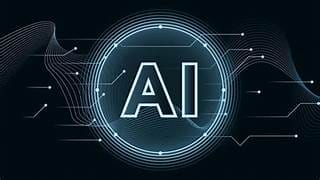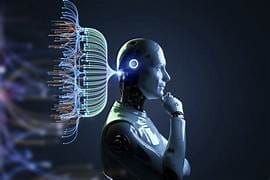The Rise of Artificial Intelligence: Transforming the Future
February 18, 2025 2025-02-14 11:37
The Rise of Artificial Intelligence: Transforming the Future
Introduction
Artificial Intelligence (AI) has become one of the most transformative technologies of the 21st century. From self-driving cars and virtual assistants to medical diagnoses and financial predictions, AI is reshaping industries and redefining how humans interact with machines. As AI continues to evolve, it promises to enhance productivity, drive innovation, and even challenge traditional notions of human intelligence. However, along with its advantages, AI also brings ethical concerns, risks, and challenges that society must address.
This article explores the origins of AI, its impact on different industries, the ethical implications of its advancements, and what the future holds for this revolutionary technology.
What is Artificial Intelligence?
AI refers to the ability of machines to perform tasks that typically require human intelligence. These tasks include problem-solving, decision-making, speech and image recognition, learning from data (Machine Learning), and understanding natural language. AI systems are designed to simulate human cognitive processes, enabling them to analyze vast amounts of data, recognize patterns, and make decisions with minimal human intervention.
Types of AI
AI can be classified into three main categories:
- Narrow AI (Weak AI)
- Designed for specific tasks (e.g., facial recognition, voice assistants like Siri or Alexa).
- Cannot perform tasks beyond its programming.
- General AI (Strong AI)
- Aims to mimic human intelligence across multiple domains.
- Still theoretical, as no AI currently possesses human-like reasoning or emotions.
- Superintelligent AI
- Hypothetical AI that surpasses human intelligence.
- A concept often discussed in science fiction and AI ethics debates.
AI in Different Industries
1. Healthcare 🏥
AI is revolutionizing the healthcare sector by enabling early disease detection, personalized medicine, and robotic surgeries. AI-driven algorithms can analyze medical images, detect cancer, and predict patient outcomes with high accuracy. Examples include IBM Watson, which assists doctors in diagnosing diseases, AI-powered prosthetics that adapt in real-time to users’ movements, and AI-driven drug discovery that accelerates the search for new treatments.
2. Finance 💰
The financial industry leverages AI for fraud detection, algorithmic trading, and personal finance. AI helps detect suspicious transactions, analyze market trends for automated trades, and improve customer service through AI-powered chatbots.
3. Automotive Industry 🚗
AI is the backbone of self-driving cars, improving road safety and reducing human error. Companies like Tesla, Waymo, and Uber use AI-powered systems for autonomous navigation, traffic prediction, and collision avoidance.
4. Education 🎓
AI enhances learning through personalized tutoring systems, automated grading of assignments, and AI-driven educational platforms like Duolingo and Coursera. AI can also adapt learning materials to fit individual student needs.
5. Customer Service 📞
AI chatbots and virtual assistants provide 24/7 support, answering customer queries and improving response times. Companies like Google, Amazon, and Microsoft use AI for voice recognition (Google Assistant, Alexa, Siri) and chatbot support in businesses (e.g., ChatGPT, LivePerson).
6. Entertainment 🎥
Streaming services like Netflix, Spotify, and YouTube use AI to recommend content based on user preferences. AI also plays a role in video game development, music composition, and deepfake technology.
The Ethical Implications of AI
Despite its benefits, AI raises several ethical concerns:
1. Job Displacement
Automation powered by AI is replacing human jobs in industries like manufacturing, customer service, and data entry. While AI creates new job opportunities, workers must reskill to stay relevant.
2. Bias in AI
AI models learn from existing human data, which may contain biases. This can lead to discriminatory hiring practices, unfair credit scoring, and racial or gender bias in law enforcement AI tools.
3. Privacy Concerns
AI relies on big data, raising concerns about personal privacy and data security. Companies collect user data for targeted advertising, which can lead to surveillance risks, data breaches, and unauthorized tracking.
4. AI in Warfare
The development of autonomous weapons raises ethical and security concerns. Nations are debating regulations to prevent AI-powered weapons from making life-or-death decisions.
5. Misinformation and Deepfakes
AI-generated fake news, altered videos, and deepfake content can spread misinformation, influencing public opinion and politics.
The Future of AI: What Lies Ahead?
AI is continuously evolving, with new breakthroughs shaping its future. Some predictions for the coming decades include:
1. AI and Human Augmentation
AI could enhance human capabilities through brain-computer interfaces (e.g., Neuralink) and bionic enhancements.
2. AI in Space Exploration
AI-powered robots and rovers will play a crucial role in future Mars missions and interstellar exploration.
3. Explainable AI (XAI)
As AI becomes more complex, researchers are working on explainable AI to make its decision-making processes more transparent and understandable.
4. Stronger AI Regulations
Governments worldwide are developing AI policies and ethical guidelines to ensure responsible AI development and prevent misuse.
5. AI and Consciousness
Some researchers are exploring whether AI could one day develop self-awareness or emotions, leading to debates about machine rights and AI ethics.
Conclusion
Artificial Intelligence is transforming industries, revolutionizing daily life, and shaping the future of human society. While AI brings incredible benefits—enhancing efficiency, innovation, and decision-making—it also presents ethical, economic, and security challenges. As AI continues to evolve, it is crucial to balance technological progress with ethical considerations to ensure a future where AI serves humanity responsibly.
🚀 The AI revolution has just begun—are we ready for what comes next?
Related Posts
The Rise of Artificial Intelligence: Transforming the Future
February 18, 2025 2025-02-14 11:37Popular Tags






























